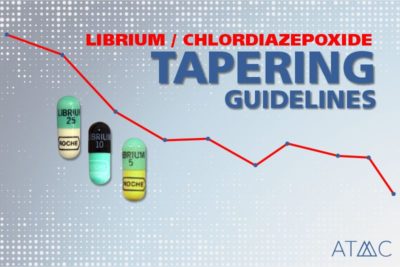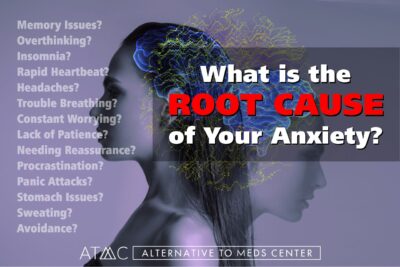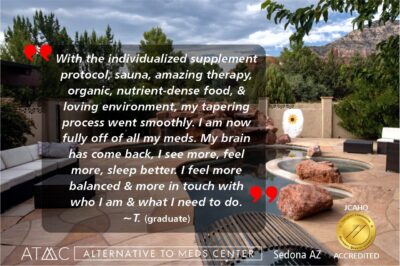Last Updated on December 29, 2023 by
Alternative to Meds Editorial Team
Medically Reviewed by Dr Samuel Lee MD
Table of Contents:

Last Updated on December 29, 2023 by
Alternative to Meds Editorial Team
Medically Reviewed by Dr Samuel Lee MD

Proper Lithium tapering requires specialized treatment performed strategically and compassionately by an experienced team under medical supervision and oversight — our specialty.
Do not try tapering from Librium on your own. Tapering from any benzodiazepine needs careful monitoring and oversight by your medical practitioner or team. None of the below information is intended as medical advice but covers points to open a discussion with your licensed prescriber or whoever you have chosen to assist your Librium tapering.
 Inpatient treatment is recommended over outpatient.
Inpatient treatment is recommended over outpatient.Each person is a unique individual with different circumstances of age, general health, length of time on Librium, dosage, quality of diet, symptom profile, and many other factors. While there is no single cookie-cutter approach to tapering off Librium, our best recommendation is for inpatient Librium tapering in a closely monitored setting. With guidance and careful support, the timeline is generally suggested on average to be 8 to 12 weeks inpatient. For safety and other reasons, longer timelines may be required in an outpatient setting.
Working with a prescriber is recommended because the dosages will need to be adjusted to smaller increments as the taper progresses. If withdrawals become too harsh the dosage may temporarily need to be raised to allow stabilization of symptoms. Then the taper can proceed again at a slower pace. Homeopathic dose reductions (extremely diluted) may be recommended for gently finishing a Librium taper, to help make the experience much more tolerable.25
For example, your prescriber may recommend a cut of 5%, 10% or even 25% as a starting point. However, leaving adequate time to stabilize before further cuts are made is of utmost importance. Your physician may advise leaving each dose unchanged for several weeks to see how the change is tolerated, or even for several months if needed before the next adjustment is introduced.26
At Alternative to Meds, cross-tapering, bridge medications, and other strategies can be used to ease a particularly difficult point. For example, crossing over to another drug may lessen symptoms, so tapering can be comfortably continued. The temporary use of adjunctive medications can also play a role in easing symptoms where a difficult impasse is reached. Librium tapering, as with all benzodiazepines, can be more complex than is easily managed on your own. If inpatient help is not available to you, at the very least find a physician who is familiar with benzodiazepine tapering to assist you in an outpatient setting. There is a resource to find outpatient help by geographical location at a website called IMMH.org. There you will find integrative physicians who are specialists in their field and may be able to provide the careful oversight you need for getting off Librium safely.
Librium is the very first benzodiazepine ever developed. Librium has been on the market in the US since 1960 and is currently classified with all other benzodiazepines as Schedule IV drugs. These are drugs that have medical uses but because of their potential for abuse and addiction, are governed by penalties under those listed for Schedule I drugs, such as heroin and methamphetamines.33
The rise in popularity of Librium was colossal as the drug was seen as something of a new miracle pill for “almost anything that ails ya.” It enjoyed unbridled success until reports began to accumulate concerning its highly addictive properties and side effects. Now it is broadly known that gradually stopping Librium is the safest method to get off Librium without suffering the now legendary harsh symptoms with which withdrawal from Librium is associated. The FDA label for Librium advised the drug should not be prescribed for more than 4 months.1
Please note that currently, benzodiazepines as a class of drugs have been recommended to be restricted to 2 to 4 weeks at most.6,7
Because of its sedative/hypnotic effects, and because the drug has anticonvulsive properties, Librium is FDA-approved for use during acute alcohol withdrawal and is considered a first-line treatment choice to avoid seizures, hallucinations, and delirium tremens that can occur if alcohol withdrawal is left untreated. When used for several days in this way, Librium tapering is then initiated over a 7-10 day period.5 Librium is also approved as a pre-surgical sedative. Although the label states that stress-related or day-to-day anxiety does not usually require treatment with Librium, it is approved to treat anxiety disorders.1
Restrictions have been placed on prescribing benzodiazepines for long-term use, and stopping Librium is generally advised after a short time frame of use. Librium tapering should be done gradually, not all at once.
Off-label use of Librium has developed for various other conditions, including catatonia and as an add-on medication in the treatment of bipolar, and psychosis, or as an adjuvant to antipsychotics, SSRIs, and SNRIs. Chlordiazepoxide should not be combined with alcohol, opioids, or other benzodiazepines or CNS depressants, due to the augmented risk of over-sedation.8
Research has indicated that even short-term use of benzodiazepines can cause withdrawal symptoms to emerge on cessation and that these can be particularly harsh and long-lasting after long-term use. Here are some of the reactions that may occur after abrupt withdrawal, especially after long-term use, more commonly in the elderly, and typically to a lesser extent, during controlled and gradual Librium tapering: 11-16
Librium is used in acute alcohol withdrawal to lower a racing heart rate and can prevent cardiac damage. Librium also decreases respiration. All benzodiazepines can cause dangerously low blood pressure, hypotension, and respiratory depression, which can lead to coma or death.17
These side effects show the risks of continuing to use Librium and can be avoided by a safe, gradual Librium tapering program.
A nationwide study in China was published in 2017 that showed a significant link between migraine headaches and short-acting benzodiazepines, but not long-acting benzos. Librium is generally considered a long-acting benzodiazepine, but studies show that its half-life measurements can vary greatly depending on individual factors. The half-life of Librium ranges from 5 to 30 hours or longer. Other medical issues found linked with migraines were insomnia, sleep disorders, and stroke.18,19
Many medical researchers have hoped to shed light on unexplainable symptoms of anxiety. Anxiety that seems unrelated to real-world trauma, threat, or other situational reasons has continued to puzzle practitioners and patients alike. An example of real-world anxiety might be living in a neighborhood where 2 shootings a week occur, which could easily cause a person to feel anxiety, even daily. 
Unfortunately, a quick prescription of Librium will most likely not be able to fix the problem, and continuing on a benzodiazepine for more than a couple of weeks is a recipe for potential disaster. Benzodiazepines are well-documented for their harsh adverse effects and potential injuries they can give rise to, especially after long-term use.1,9 So a student in this scenario who was medicated may end up having to take time away from school at some point to get through a Librium tapering program.
Dr. William Walsh, a holistic psychiatrist and Founder of the Walsh Research Institute has said that discovering a connection between common psychiatric conditions and a patient’s nutrition as well as their toxicity levels has changed the way he practices. Now he routinely does preliminary lab tests to determine whether such factors are present, and prefers to treat patients with nutritional therapy as a first-line treatment over psychiatric drugs. Dr. Walsh says in his book, Nutrient Power: Heal Your Biochemistry, Heal Your Brain.3
“Psychiatry has made impressive advances in the past 50 years but needs a new direction. Today’s emphasis on drug medications will not stand the test of time.” ~ Dr. William Walsh, Ph.D., FACN, Founder of Walsh Research Institute

To continue on with the prescription-drug-as-the-only-treatment model could almost be seen as willful negligence when we have so much superior technology and so many safer, more effective modes of treatment available in modern medicine. But we cannot always blame the doctors, for they were all trained at similar universities, where their curriculum contained very little to none of this research data nor did their largely pharmaceutical-funded universities likely hint at other approaches to treating symptoms of mental distress besides medication.2
We invite you to look at the many alternatives to anti-anxiety medication on our services overview page, and on our benzodiazepine alternatives pages.
BE AWARE: Benzodiazepine tapering SHOULD BE GRADUAL. A person who chooses Librium tapering should not abruptly stop the drug but seek guidance and oversight from a trusted medical practitioner who is familiar with tapering Librium and can offer strategies to soften the expected benzodiazepine withdrawals.1,6,26
A benzodiazepine can produce many unwanted side effects, in addition to a lack of efficacy for handling a person’s original symptoms. Some of these side effects can escalate quickly, necessitating the need for not only Librium tapering but discovering and addressing the actual causes of the symptoms that the person is experiencing. Though the medical consensus is confident that withdrawal from Librium must be gradual, there is much more that can be learned about how to get off Librium safely without relapse of symptoms. 
Did your physician have your zinc and copper ratios tested, or call for other nutritional and toxicity tests done prior to your being prescribed Librium? 4 Were food allergies tested?20 Were other types of allergies or exposure to molds ever checked? 21 Were nutritional deficiencies tested for and remedied before the prescription for Librium was given? 1,22
So now, we take a step back before rushing headlong into trying to quit Librium while ignoring these potentially still active problems. Before starting the process of tapering Librium, our clients receive a battery of tests, and other assessments, to determine what the most efficient treatment plan will be. With the administration and correction of supplements and IV treatments, removal of toxicity from the body, providing a clean toxin-free and nutrient-dense diet, and other important preliminary actions, clients often respond very quickly with improvements in quality of sleep, a calmer and brighter mood, better appetite, etc. When these changes have become stable, then Librium tapering can begin, always at a gradual pace that is monitored on a daily basis and adjustments made as needed to accomplish getting off Librium without worsening insomnia, anxiety, panic attacks, and other potentially harsh side effects.
There is much to understand about how Alternative to Meds Center’s drug cessation programs are administered in our beautiful, well-staffed inpatient facility. The educational components of the program are invaluable for pursuing life-long natural mental health. We very much welcome your call to discuss your situation in detail. Get all your questions answered by one of our friendly and knowledgeable staff about the many benefits of correctly administered, comfortable Librium tapering.
1. FDA label information Librium (chlordiazepoxide HCI) [cited 2022 July 26]
2. Schofferman J. The medical-industrial complex, professional medical associations, and continuing medical education. Pain Med. 2011 Dec;12(12):1713-9. doi: 10.1111/j.1526-4637.2011.01282.x. Epub 2011 Dec 6. PMID: 22145759. [cited 2022 July 26]
3. Excerpt from the book entitled “Nutrient Power: Heal Your Biochemistry, Heal Your Brain” by William Walsh Ph.D. FACN [cited 2022 July 26]
4. Russo AJ. Decreased zinc and increased copper in individuals with anxiety. Nutr Metab Insights. 2011 Feb 7;4:1-5. doi: 10.4137/NMI.S6349. PMID: 23946656; PMCID: PMC3738454. [cited 2022 July 26]
5. Kattimani S, Bharadwaj B. Clinical management of alcohol withdrawal: A systematic review. Ind Psychiatry J. 2013;22(2):100-108. doi:10.4103/0972-6748.132914 [cited 2022 July 26]
6. Ashton H. Guidelines for the rational use of benzodiazepines. When and what to use. Drugs. 1994 Jul;48(1):25-40. doi: 10.2165/00003495-199448010-00004. PMID: 7525193. [cited 2022 July 26]
7. Lader MH. Limitations on the use of benzodiazepines in anxiety and insomnia: are they justified? Eur Neuropsychopharmacol. 1999 Dec;9 Suppl 6:S399-405. doi: 10.1016/s0924-977x(99)00051-6. PMID: 10622686. [cited 2022 July 26]
8. Ahwazi HH, Abdijadid S. Chlordiazepoxide. [Updated 2021 Nov 14]. In: StatPearls [Internet]. Treasure Island (FL): StatPearls Publishing; 2022 Jan-. Available from: https://www.ncbi.nlm.nih.gov/books/NBK547659/ [cited 2022 May 10]
9. Shinfuku M, Kishimoto T, Uchida H, Suzuki T, Mimura M, Kikuchi T. Effectiveness and safety of long-term benzodiazepine use in anxiety disorders: a systematic review and meta-analysis. Int Clin Psychopharmacol. 2019 Sep;34(5):211-221. doi: 10.1097/YIC.0000000000000276. PMID: 31274696. [cited 2022 July 26]
10. Pizzorno J. Can We Say “Cure”?. Integr Med (Encinitas). 2016;15(5):8-12. [cited 2022 July 26]
11. MacKinnon GL, Parker WA. Benzodiazepine withdrawal syndrome: a literature review and evaluation. Am J Drug Alcohol Abuse. 1982;9(1):19-33. doi: 10.3109/00952998209002608. PMID: 6133446. [cited 2022 July 26]
12. Străulea AO, Chiriţă V. Managementul sindromului de abstinenţă in dependenţa la benzodiazepine [The withdrawal syndrome in benzodiazepine dependence and its management]. Rev Med Chir Soc Med Nat Iasi. 2009 Jul-Sep;113(3):879-84. Romanian. PMID: 20191849. [cited 2022 July 26]
13. Pétursson H. The benzodiazepine withdrawal syndrome. Addiction. 1994 Nov;89(11):1455-9. doi: 10.1111/j.1360-0443.1994.tb03743.x. PMID: 7841856. [cited 2022 July 26]
14. Edinoff AN, Nix CA, Hollier J, Sagrera CE, Delacroix BM, Abubakar T, Cornett EM, Kaye AM, Kaye AD. Benzodiazepines: Uses, Dangers, and Clinical Considerations. Neurol Int. 2021 Nov 10;13(4):594-607. doi: 10.3390/neurolint13040059. PMID: 34842811; PMCID: PMC8629021. [cited 2022 July 26]
15. Alicja Lerner, Michael Klein, Dependence, withdrawal and rebound of CNS drugs: an update and regulatory considerations for new drugs development, Brain Communications, Volume 1, Issue 1, 2019, fcz025 [cited 2022 July 26]
16. Ashton, H, Protracted Withdrawal from Benzodiazepines: The Post-Withdrawal Syndrome excerpted from Psychiatric Annals Journal 25:3/March 1995, pp 174-179 [Internet] [cited 2022 July 26]
17. Package Leaflet Librium Information for the user, 5mg and 10mg capsules Chlordiazepoxide hydrochloride Mylan Pharmaceutical published 2018 Aug [cited 2022 July 26]
18. Harnod T, Wang YC, Lin CL, Tseng CH. Association between use of short-acting benzodiazepines and migraine occurrence: a nationwide population-based case-control study. Curr Med Res Opin. 2017 Mar;33(3):511-517. doi: 10.1080/03007995.2016.1266313. Epub 2017 Jan 4. PMID: 27893291. [cited 2022 July 26]
19. Ashton H, Benzodiazepine Equivalence Table [revised published online April 2007] [cited 2022 July 26]
20. Hidese S, Nogawa S, Saito K, Kunugi H. Food allergy is associated with depression and psychological distress: A web-based study in 11,876 Japanese. J Affect Disord. 2019 Feb 15;245:213-218. doi: 10.1016/j.jad.2018.10.119. Epub 2018 Oct 26. PMID: 30408639. [cited 2022 July 26]
21. Empting LD. Neurologic and neuropsychiatric syndrome features of mold and mycotoxin exposure. Toxicol Ind Health. 2009 Oct-Nov;25(9-10):577-81. doi: 10.1177/0748233709348393. PMID: 19854819. [cited 2022 July 26]
22. Gibson-Smith D, Bot M, Brouwer IA, Visser M, Giltay EJ, Penninx BWJH. Association of food groups with depression and anxiety disorders. Eur J Nutr. 2020 Mar;59(2):767-778. doi: 10.1007/s00394-019-01943-4. Epub 2019 Apr 3. PMID: 30945032; PMCID: PMC7058560. [cited 2022 July 26]
23. Waldron I. Increased prescribing of Valium, Librium, and other drugs–an example of the influence of economic and social factors on the practice of medicine. Int J Health Serv. 1977;7(1):37-62. doi: 10.2190/FPJT-V9YE-VWM1-UXPA. PMID: 319068. [cited 2022 July 26]
24. Sarangi A, McMahon T, Gude J. Benzodiazepine Misuse: An Epidemic Within a Pandemic. Cureus. 2021;13(6):e15816. Published 2021 Jun 21. doi:10.7759/cureus.15816 [cited 2022 July 26]
25. Ogbonna C, Lembke A, Tapering patients Off of Benzodiazepines [American Family Physician, published Nov 1, 2017 [online] [cited 2022 July 26]
26. National Center for PTSD information sheet, Effective Treatments for PTSD: Helping Patients Taper from Benzodiazepines [published online 2013] [cited 2023 July 26]
27. Aucoin M, LaChance L, Naidoo U, Remy D, Shekdar T, Sayar N, Cardozo V, Rawana T, Chan I, Cooley K. Diet and Anxiety: A Scoping Review. Nutrients. 2021 Dec 10;13(12):4418. doi: 10.3390/nu13124418. PMID: 34959972; PMCID: PMC8706568. [cited 2023 July 26]
28. Banno M, Harada Y, Taniguchi M, Tobita R, Tsujimoto H, Tsujimoto Y, Kataoka Y, Noda A. Exercise can improve sleep quality: a systematic review and meta-analysis. PeerJ. 2018 Jul 11;6:e5172. doi: 10.7717/peerj.5172. PMID: 30018855; PMCID: PMC6045928. [cited 2023 July 26]
29. Vorkapic CF, Rangé B. Reducing the symptomatology of panic disorder: the effects of a yoga program alone and in combination with cognitive-behavioral therapy. Front Psychiatry. 2014 Dec 8;5:177. doi: 10.3389/fpsyt.2014.00177. PMID: 25538634; PMCID: PMC4259001.[cited 2023 July 26]
30. Abbott R, Lavretsky H. Tai Chi and Qigong for the treatment and prevention of mental disorders. Psychiatr Clin North Am. 2013 Mar;36(1):109-19. doi: 10.1016/j.psc.2013.01.011. PMID: 23538081; PMCID: PMC3917559. [cited 2023 July 26]
31. Scott AJ, Webb TL, Martyn-St James M, Rowse G, Weich S. Improving sleep quality leads to better mental health: A meta-analysis of randomised controlled trials. Sleep Med Rev. 2021 Dec;60:101556. doi: 10.1016/j.smrv.2021.101556. Epub 2021 Sep 23. PMID: 34607184; PMCID: PMC8651630. [cited 2023 July 26]
32. Santos MAD, Conceição APD, Ferretti-Rebustini REL, Ciol MA, Heithkemper MM, Cruz DALMD. Non-pharmacological interventions for sleep and quality of life: a randomized pilot study. Rev Lat Am Enfermagem. 2018 Nov 14;26:e3079. doi: 10.1590/1518-8345.2598.3079. PMID: 30462790; PMCID: PMC6248705. [cited 2023 July 26]
33. Drug Enforcement Administration Bullentin Benzodiazepines [published Dec 2018] [cited 2023 July 31]
34. Benzodiazepines: FDA Boxed Updated to Improve Safe Use published 2020 Sept 23 [cited 2023 Dec 4]
Originally Published Nov 4, 2019 by Lyle Murphy

Dr. Michael Loes is board-certified in Internal Medicine, Pain Management and Addiction Medicine. He holds a dual license in Homeopathic and Integrative Medicine. He obtained his medical doctorate at the University of Minnesota, Minneapolis, MN, 1978. Dr. Loes performed an externship at the National Institute of Health for Psychopharmacology. Additionally, he is a well-published author including Arthritis: The Doctor’s Cure, The Aspirin Alternative, The Healing Response, and Spirit Driven Health: The Psalmist’s Guide for Recovery. He has been awarded the Minnesota Medical Foundation’s “Excellence in Research” Award.

Lyle Murphy is the founder of the Alternative to Meds Center, a licensed residential program that helps people overcome dependence on psychiatric medication and addiction issues using holistic and psychotherapeutic methods.

Can you imagine being free from medications, addictive drugs, and alcohol? This is our goal and we are proving it is possible every day!
Read All StoriesView All Videos